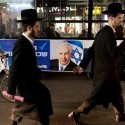Last Thursday evening, young Charedim met with Prime Minister Benyamin Netanyahu as part of a “Young Likud” program. Aharon Ben-Yaakov, one of the ultra-Orthodox young people who attended the meeting, walked to the microphone and asked the prime minister: “Does the Likud under your leadership also represent people like me who aren’t represented by the ultra-Orthodox Haredi parties? People like me who served in the IDF, learn academics and work for a living?”
The Prime Minister replied: “Of course it does. Leave the party atmosphere and the sector parties and join Likud. Only in this way will we maintain a strong country and a greater Likud – against all the left-wing”.
In the Likud primaries that were held recently, the Charedi camp did not offer any representation on behalf of the Likud, but they issued a list in support of a number of Knesset members including Moshe Feiglin, who decided after the primaries to leave the Likud.
Conversely, it is beginning to look like there is a possibility for a future coalition between the Labour Party, or as they are now known, “the Zionist Camp”, and the Charedi parties. In a shidduch that only makes sense in Israeli politics, Isaac Herzog is beginning to woo the religious parties.
Religious faction leaders, Jacob Litzmann, Moshe Gafni, and Aryeh Deri have not ruled out the possibility in recent speeches, and have refused to commit publicly to support only the right-wing government led by Benjamin Netanyahu. This has led to a division, driving Chabad voters away.
Saturday night, during a joint conference of Herzog and Livni held in Hod Hasharon, Herzog addressed the issue of equality of burden and attacked in a clear hint, the parties that have created a campaign of hatred.
” Bubbling undercurrents and sometimes arrogance and exclusion, have separated them from Zionists” have prevented them from integrating into the mainstream of the country. We know how to combine them all and we will work with a broad consensus,” Herzog said.
Herzog later evaded the question of whether his party would force the issue equal burden law on the ultra-Orthodox community, and said again that “everything will be done through dialogue and consensus.” This equal burden law is, of course, a reference the law by which, according to which thousands of Haredi Yeshivah students will be drafted into the Israeli Defense Forces beginning in 2017. It is a divisive issue in Israeli politics, one which the left is, in theory, supposed to oppose.

